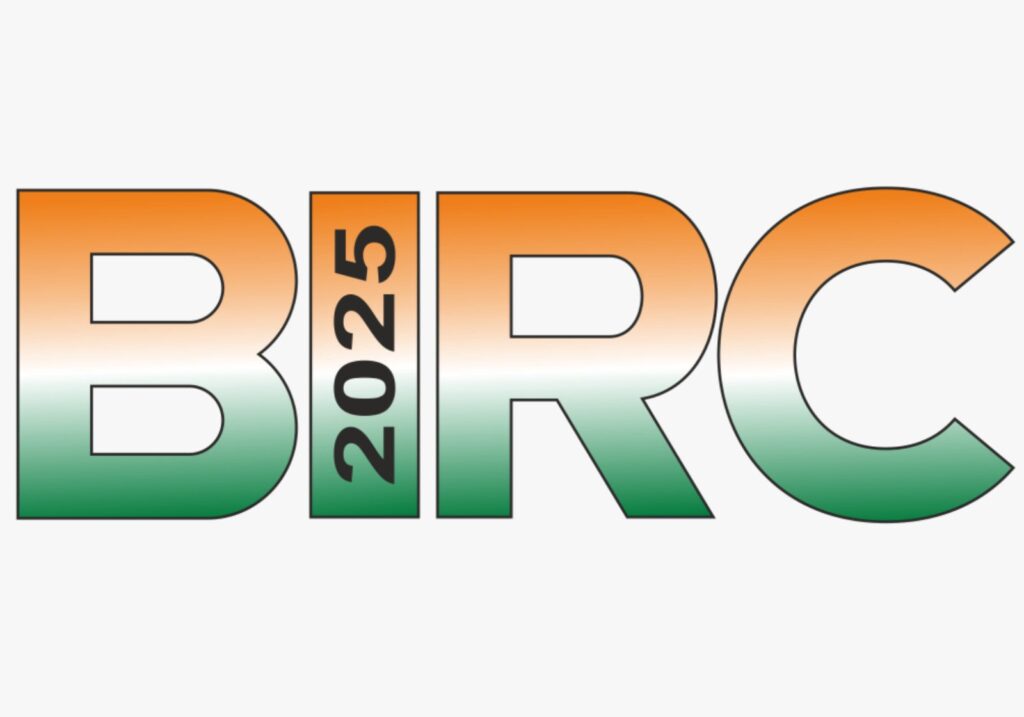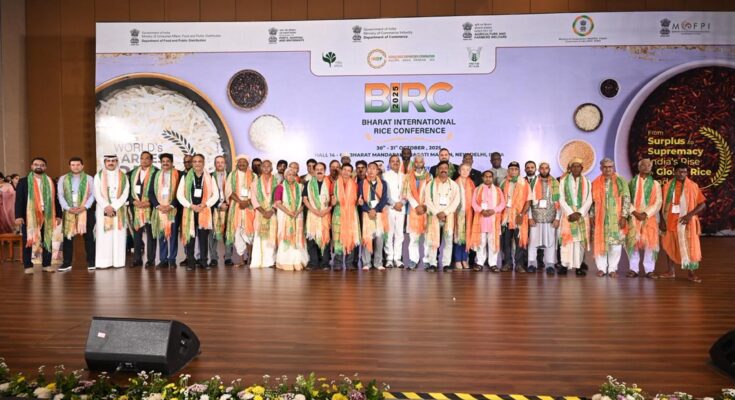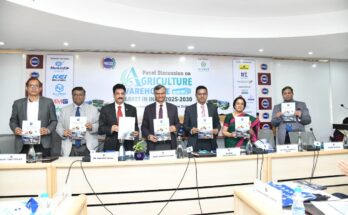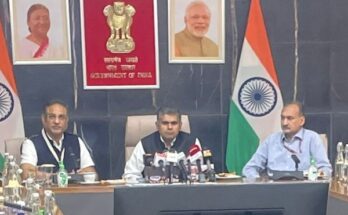The two-day Bharat International Rice Conference (BIRC) 2025 concluded on October 31 today at Mandapam, New Delhi, marking a milestone moment for India’s agriculture and export sectors. On Day One, MoUs worth over ₹3,000 crore were signed. Of these, the government alone facilitated agreements worth over ₹2,200 crore with private companies in Bihar for GI varieties of rice such as Katarni rice, in addition to other MoUs signed between Indian rice companies and their Indian and foreign counterparts.
Organized under the institutional support of Agricultural  & Processed Food Products Export Development Authority (APEDA), Ministry of Commerce & Industry, Government of India, other government and industry specific bodies the conference brought together global buyers, exporters, policymakers, and technology leaders to deliberate on the future of India’s rice trade and agricultural innovation.
& Processed Food Products Export Development Authority (APEDA), Ministry of Commerce & Industry, Government of India, other government and industry specific bodies the conference brought together global buyers, exporters, policymakers, and technology leaders to deliberate on the future of India’s rice trade and agricultural innovation.
The event began with an inaugural ceremony that featured the live launch of India’s first AI-based rice sorting system, followed by the felicitation of 17 Indian farmers by international importers — recognizing their contribution to India’s growing prominence in the global rice trade. The inauguration also showcased advanced machinery and processing solutions designed to enhance efficiency, precision, and quality in rice production. At least 7800 participants from India and globally participated at the day one at the event
India aims to tap into global rice trade worth Rs 1.8 lakh crore through the event. Deals close to Rs 25,000 crore are likely to be signed. Representatives from at least 80 countries joined the meet, backed by the Department of Commerce, Ministry of Commerce and Industry.
Dr. Prem Garg, National President of the Indian Rice Exporters Federation (IREF), said: “Farmers are at the heart of the Bharat International Rice Conference story. With technology like AI-driven sorting and precision processing, we are entering a new era of agricultural excellence. BIRC 2025 stands as a platform where innovation, trade, and sustainability converge to build a proud and prosperous India.”
As a mark of recognition for their invaluable contribution to India’s rich rice heritage, several distinguished farmers from across the country were felicitated at the Bharat International Rice Conference (BIRC) 2025 – Anand Malik from West Bengal, cultivator of the aromatic Govind Bhog rice; Surendra Masti from Odisha, known for Kalajeera-Koraput rice; Dr. Manjul Pratap Singh and Ajay Singh from Uttar Pradesh, cultivators of the prized Type-3 Dehradhuni Basmati; and Zafar Ahmad Bhat from Jammu & Kashmir, who preserves the legacy of the fragrant Mushkbudji variety. The list also included Khangenbam Shamusaba Singh from Manipur, cultivator of the famed Chak Hao black rice; Mahan Chandra Borah from Assam, known for Joha rice; Subodh Choudhry from Bihar, who grows the traditional Katarni rice; Janardanan Karoth Veetil and Indira P from Kerala, both renowned for Kaipad rice; and Banamali Pujari and Kochu Kumar from Odisha and Kerala, respectively, for their cultivation of the Indrani variety among others. Their dedication reflects India’s vast biodiversity and cultural connection with rice farming.
The first session, Global Rice Market Evolution, moderated by Mayank Bhardwaj (Thomson Reuters), featured insights from Dr. Ashok Gulati (ICRIER), Dr. Prem Garg (IREF), B.V. Krishna Rao (TREA-K), Nitin Gupta (Olam Agri), Khalid Husain Khan (ITC), Piero Carello (S&P Global), and Unupom Kaushik (NCEL). Experts discussed global demand patterns, export diversification, and the evolving role of India as a consistent rice supplier.
The final session, Value Addition in Rice, moderated by Hina Shukla (The Economic Times), saw participation from Tarun Bajaj (APEDA), Dr. Nese Sreenivasulu (IRRI), Arun Kumar Behera (Odisha Govt), Ranjit Singh (MOFPI), Vinita Sudhanshu (APEDA), and Peter Salam (Manipur Agriculture). The discussion emphasized branding, packaging, and technological upgradation as key drivers for premiumization in rice exports.
For many farmers, BIRC marked a shift from traditional selling under the Minimum Support Price (MSP) framework toward securing better market-linked prices. By directly connecting producers with global buyers, BIRC enabled farmers to explore premium markets and realize greater value for their hard work—a decisive step toward empowering India’s agricultural backbone and promoting inclusive growth in the rice sector. The second day concluded with more talks and a large number of B2B meetings.




